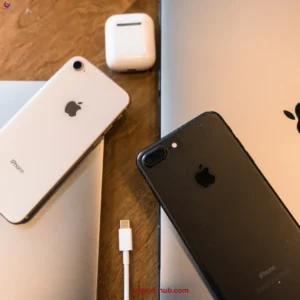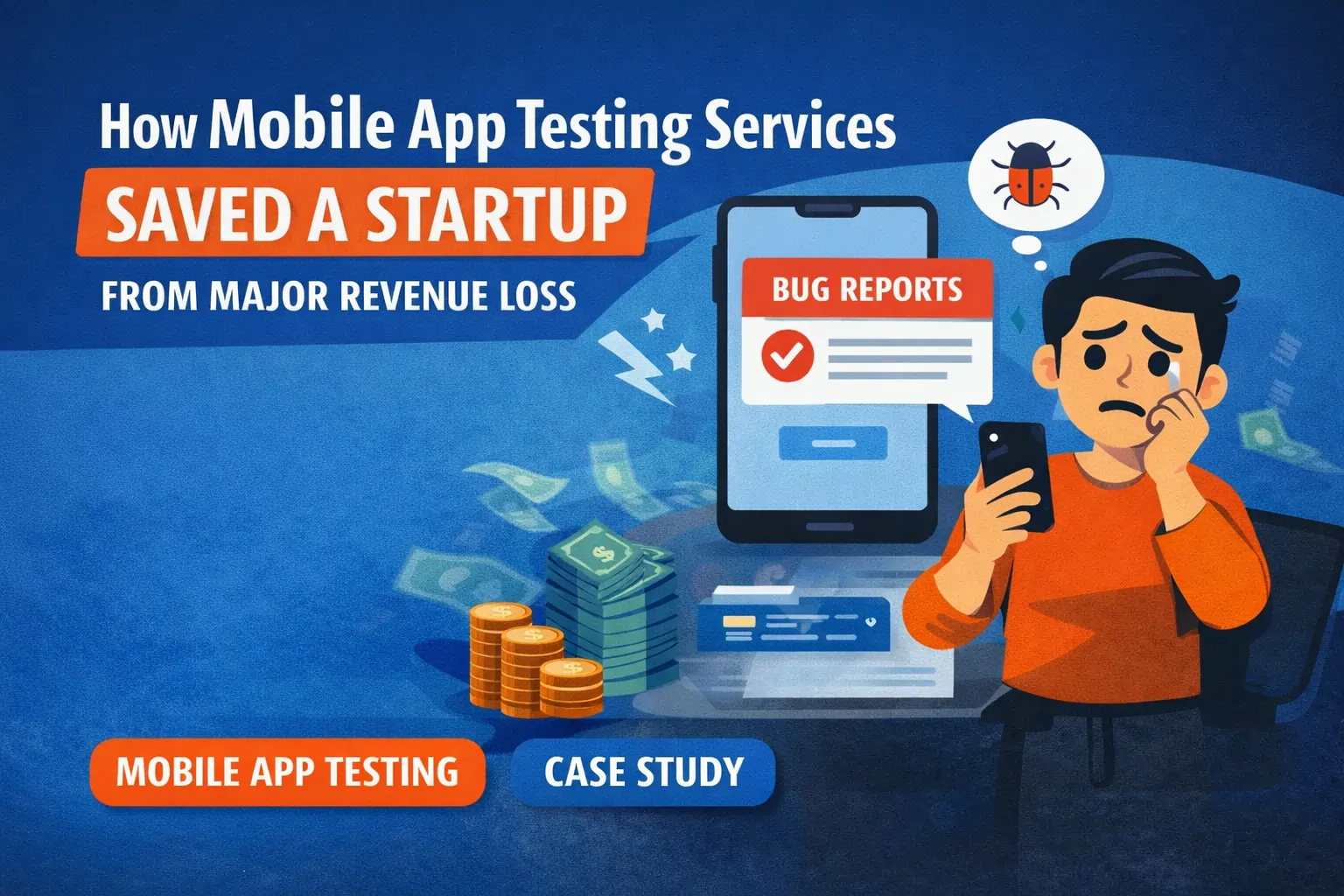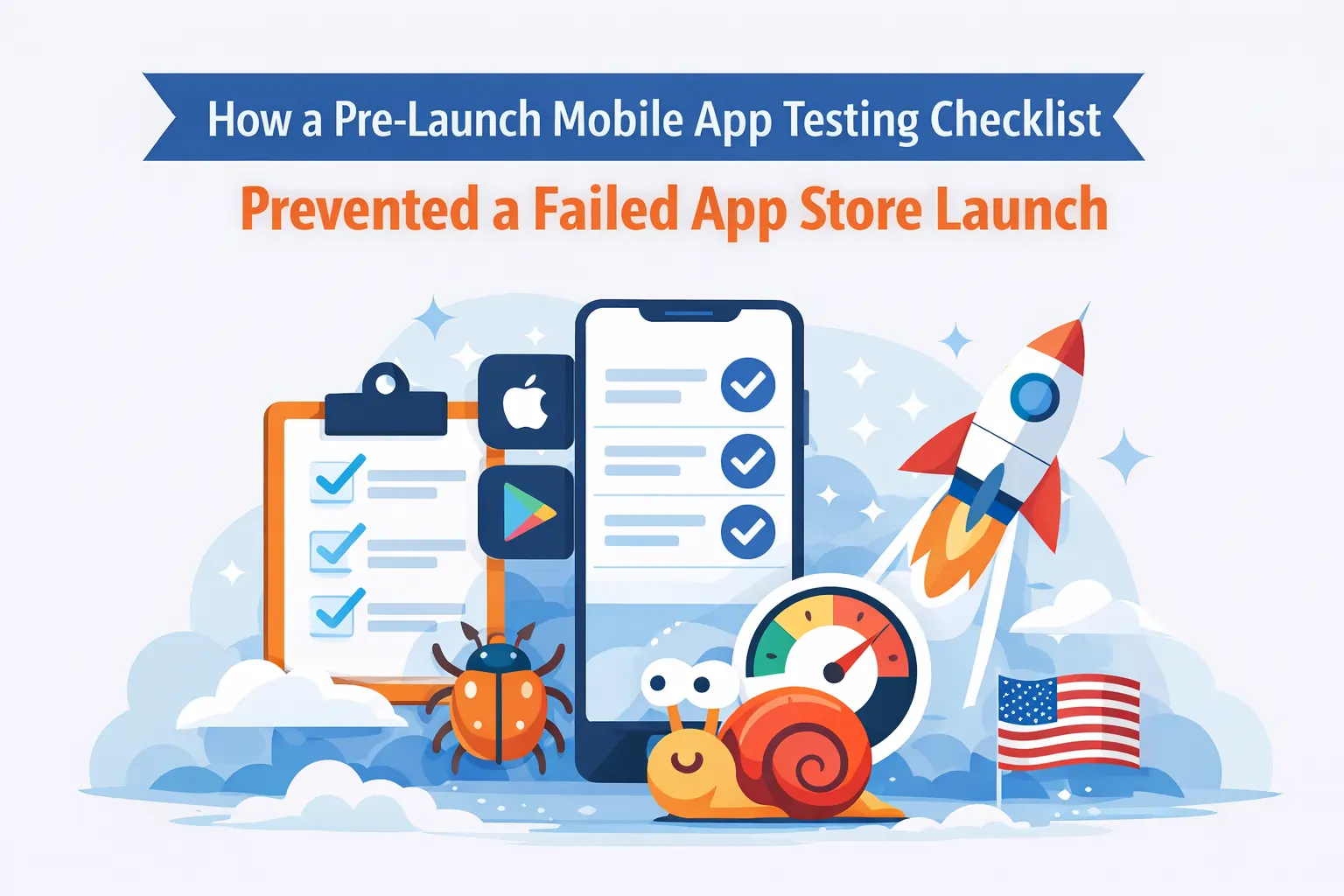iOS Mobile App Testing: How to Write Effective Test Cases for Quality Assurance
iOS app testing services and iOS mobile app testing are crucial elements in the mobile app development process, especially for iOS apps where high user expectations and strict App Store guidelines are the norm. Proper testing ensures the app operates smoothly, delivers an exceptional user experience, and complies with all necessary quality standards. This comprehensive guide will walk you through the process of writing effective test cases for iOS mobile app testing, emphasizing the role of automated iOS app testing, covering both functional and non-functional aspects, and much more. By utilizing expert iOS app testing services, you can guarantee that your app performs as intended and meets the high standards set by both users and the App Store.
Why Effective Test Cases Are Crucial in iOS Mobile App Testing
Test cases are essential to the testing process. They act as a guide for assessing the functionality, usability, and performance of an iOS app. Well-crafted test cases can uncover bugs early in development and ensure that the app operates as intended on actual devices.
Challenges in iOS Mobile App Testing
iOS testing comes with its own set of challenges that testers must address to ensure the delivery of high-quality apps:
- Device Fragmentation: With a variety of iPhone and iPad models featuring different screen sizes and hardware configurations, ensuring your app functions correctly across all devices can be a time-intensive process. This requires thorough planning and testing across multiple devices.
- Version Compatibility: iOS apps must work seamlessly across a range of iOS versions, from the latest updates to older iterations. Testing on multiple versions ensures the app is accessible to users on different devices, regardless of the iOS version they are using.
- User Expectations: Apple users have high expectations for apps, demanding a flawless and user-friendly experience. The app must meet stringent standards for performance, security, and usability to receive positive reviews and succeed in the competitive App Store environment.
Effective test cases help to address these challenges by ensuring that the app delivers consistent performance across various devices, works seamlessly across different iOS versions, and provides an optimal experience to Apple users.
Contact Us for Expert iOS Testing Solutions
Steps to Write Effective Test Cases for iOS Application Testing
Creating effective test cases involves understanding the app’s requirements, structuring the test cases appropriately, and ensuring they cover all necessary aspects of the app. Here are the steps to write comprehensive test cases.
Explore Our iOS Test Case Writing Services
1. Understand the Application Under Test
Before writing any test cases, it’s crucial to have a deep understanding of the application. This includes knowing its features, functionalities, user flows, and business objectives. Collaborating with your development team and reviewing the application’s documentation will help in this process.
By understanding the app, you can identify the different features that require testing. Some areas to focus on include:
- User workflows: How users will interact with the app from start to finish.
- Key features: Login, sign-up, push notifications, in-app purchases, etc.
- Backend Integration: APIs, data storage, and third-party integrations.
Working with iOS testing services or mobile app testing companies can provide additional insights into industry best practices, helping you understand the testing needs for a specific app type.
2. Define Clear Objectives
Each test case should have clear objectives that align with the overall goals of the application. These objectives guide the tester in understanding what to focus on during the test.
Test case objectives can include:
- Verifying the correct functionality of features.
- Ensuring the app behaves as expected across different devices.
- Testing the app’s performance and stability under load.
- Validating the app’s security, including encryption and data protection.
Having clear objectives for your iPhone app testing services ensures that every aspect of the app is tested thoroughly, from functionality to security.
3. Use a Structured Template
To ensure clarity and consistency in iOS mobile app testing, it’s important to adopt a structured approach when writing test cases. A well-organized test case template typically includes the following elements:
- Test Case ID: A unique reference code for each test case to track and identify them easily.
- Objective: A brief statement outlining the purpose of the test case (e.g., verify that the login function performs correctly).
- Preconditions: Any specific setup or conditions required before executing the test (e.g., the user must be logged out or have a valid account).
- Test Steps: A clear, sequential list of actions to be performed during the test (e.g., enter username and password, tap “Login”).
- Expected Results: The desired outcome after following the test steps (e.g., the user is redirected to the home screen).
- Actual Results: The actual outcome after the test is performed (to be filled in during execution).
By using this framework, your test cases will be consistent, reproducible, and easily understandable. This structure is particularly beneficial when working with </span>iOS app testing services or </span>mobile automation testing services, as it ensures all necessary aspects of the app are properly tested and documented.
4. Focus on One Functionality Per Test Case
To ensure clarity and easier maintenance, it’s best to focus each test case on a single functionality. Combining multiple functionalities in one test case can complicate the process and make it harder to identify the source of an issue if something goes wrong.
For instance, instead of creating a single test case that covers both logging in and updating the profile, it’s more effective to separate them into distinct test cases:
- Test Case 1: Test the login process (input username and password, then confirm successful login).
- Test Case 2: Test the profile update functionality (change user details and verify that the changes are saved).
By isolating each functionality into its own test case, the process becomes more manageable. Any issues that arise can be quickly traced back to the specific functionality being tested, enhancing the efficiency and reliability of the iOS mobile app testing process.
Write Your First Test Case Today
Leveraging Automated iOS App Testing for Efficiency
In today’s fast-paced development environment, automation plays a significant role in </span>iOS mobile app testing. Automated testing saves time, reduces errors, and provides faster feedback, especially when testing large, complex apps.
Learn More About Automated Testing Tools
Why Automation Matters in iOS Testing
Automating repetitive tests can save significant time, especially for regression testing, where you need to re-test functionalities after each update. Automation also improves accuracy, as automated tests are less likely to overlook or misinterpret test steps. By using tools like automated iOS app testing, you can run tests continuously without manual intervention.
Popular Tools for Automated iOS App Testing
There are several tools available for automated iOS app testing, each offering distinct features:
- Appium: This is an open-source automation tool that supports cross-platform testing for both iOS and Android. Appium enables writing tests in various programming languages and is compatible with multiple frameworks.
- XCTest: As Apple’s native testing framework, XCTest is integrated into Xcode, providing a smooth experience for unit, integration, and UI testing of iOS apps.
- TestFlight: Offered by Apple, this service facilitates beta testing by allowing developers to distribute their apps to testers and gather feedback on functionality, user interface, and performance.
By integrating these tools into a mobile app test automation service, teams can conduct a wide range of tests efficiently and at scale, enhancing the overall effectiveness of the testing process.
Integration with CI/CD Pipelines
Integrating automated tests into Continuous Integration (CI) and Continuous Deployment (CD) pipelines significantly enhances their effectiveness. With CI/CD, every time a developer commits new code, automated tests are executed to verify that nothing is broken. This integration speeds up the development process and maintains ongoing quality assurance. For instance, by incorporating mobile automation testing services with a CI/CD pipeline using tools such as Jenkins or CircleCI, tests can run automatically with each code change, offering quick feedback to developers.
Automate Your Testing Process.
Functional Testing in iOS Application Testing
Functional testing is an essential part of iOS application testing that ensures all features of the app perform as expected. This type of testing verifies that every functionality works according to the specified requirements.
Optimize Functional Testing for Your App
What is Functional Testing?
Functional testing focuses on testing the core functions of the app, such as login, payment processing, notifications, and in-app navigation. Each functionality is tested in isolation and in combination to ensure it works as intended.
Key Functional Areas to Test
When writing test cases for functional testing, focus on the following areas:
- User Authentication: Test login and sign-up processes, including social media logins and multi-factor authentication.
- Navigation Flow: Ensure users can navigate the app effortlessly. Test every transition between screens.
- API Integrations: Verify that the app interacts correctly with backend services, including checking for proper data exchanges.
- Input Handling: Test form fields, validation rules, and error messages to ensure the app handles user input correctly.
By conducting thorough mobile app QA testing on these areas, you can guarantee the core functionalities work seamlessly.
Ensuring Performance and Usability with Mobile App Testing Services
The performance of an iOS app is vital for ensuring user satisfaction. Slow load times or frequent crashes can lead to uninstalls and negative reviews. Usability is also a significant factor in keeping users engaged.
Why You Need Performance Testing
Performance testing is crucial for verifying that the app runs efficiently under different circumstances, like heavy user traffic or poor network conditions. It helps uncover bottlenecks, optimize loading speeds, and maintain smooth operation even during high demand.
Key Metrics to Monitor
Some key performance metrics to monitor during testing include:
- Load Times: Measure the time it takes for the app to launch and for different pages to load. Slow load times can frustrate users.
- Resource Utilization: Ensure the app doesn’t use excessive battery power or memory, which can degrade the user experience.
- Network Performance: Test the app’s behavior under various network conditions, such as slow Wi-Fi or cellular data.
Usability Testing for Better User Experience
Usability testing ensures the app is intuitive and easy to use. Common tests include checking whether the user can navigate the app without confusion and if the app provides clear instructions and feedback. Mobile usability testing focuses on identifying pain points that can affect user retention.
Security Testing in iPhone App Testing Services
Why Security Matters
As data breaches and cyberattacks are becoming more common, ensuring the security of sensitive user data and app functionality is critical. Security testing verifies that the app follows best practices for data encryption, secure communications, and authentication mechanisms.
Critical Security Areas to Test
Key security areas to focus on include:
- Authentication Mechanisms: Evaluate the security of login processes, session management, and multi-factor authentication to ensure they are robust.
- Data Encryption: Confirm that sensitive information is encrypted during transmission (over the network) and when stored (in the app’s storage).
- In-App Purchases: Make sure the app manages transactions properly and safeguards payment information.
Utilizing iPhone app testing services can assist in identifying vulnerabilities early in the development phase, thereby protecting both users and developers from possible security risks.
The Role of Mobile App Testing Companies in Quality Assurance
When working on complex iOS applications, partnering with </span>mobile app testing companies can provide numerous advantages. These companies offer dedicated teams of experienced QA professionals who specialize in mobile testing.
Partner with a Mobile App Testing Company
Why Collaborate with Testing Companies?
By outsourcing testing to professionals, you gain:
- Expertise in various testing methodologies, such as functional, non-functional, and security testing.
- Access to advanced testing tools and frameworks, including automated testing solutions.
- Scalable testing capabilities, allow you to test on multiple devices and iOS versions.
Conclusion
Effective </span>iOS mobile app testing plays a critical role in delivering high-quality apps that not only meet user expectations but also comply with Apple’s stringent guidelines. Writing precise and structured test cases ensures that each feature and functionality is thoroughly tested, reducing the chances of issues arising post-launch.
From leveraging automated iOS app testing tools to integrating </span>mobile app test automation services, businesses can optimize their testing workflows and improve app performance. Incorporating non-functional testing like security and performance evaluation further enhances the app’s reliability and user satisfaction.
Collaborating with experts like Testers HUB can simplify the process and bring unparalleled expertise to your project. Testers HUB offers comprehensive testing solutions, including mobile app QA testing, automated mobile testing, and cutting-edge cloud mobile app testing services. With a team of experienced professionals, Testers HUB ensures your iOS app is rigorously tested for quality, security, and usability.
Take the Next Step with Testers HUB
Ready to deliver a flawless iOS app? Partner with Testers HUB for end-to-end mobile application testing services.
👉 Contact Testers HUB Today!
Get Started with Expert iOS Testing Today











